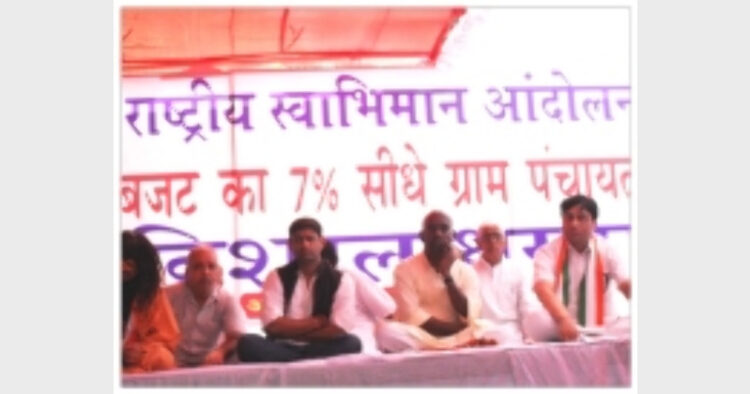Massive dharna by Rashtriya Swabhiman Andolan at Jantar Mantar
Pramod Kumar
REITERATING his demand for allocating at least seven per cent of the total union budget directly to the village Panchayats to stem corruption and to create a vibrant system, noted ideologue and thinker Shri KN Govindacharya said each of the total 2.5 lakh Panchayats of the country should be provided with Rs 40 lakh every year for development and building infrastructure.
To press upon this demand he, under the banner of Rashtriya Swabhiman Andolan, conducted a march from Rajghat to Jantar Mantar in New Delhi on October 1 and staged a massive dharna, which was attended by thousands of Panchayat representatives.
NDA convener Shri Sharad Yadav also joined the dharna and said the Village Panchayats deserve 70 per cent of the total budget and not just 7 per cent, as over 70 per cent of the total population reside in villages only. Former Minister Shri Sanjay Paswan, Arif Mohd Khan, Dr Mahesh Sharma, Shri Jagdish Shettigar and many other distinguished people representing various organisations were also present on the occasion.
“The budget allocation, if made, will transform the village economy, and the country will go on a fast track development process. The 1991 economic liberalisation has not benefitted the rural areas or its economy. It has rather led to further negligence of the largest segment of the population. Villages harbour 70 per cent of the population and unless they are given effective powers to function, the rays of skewed development process would never reach them. The government should make a beginning,” he said while addressing the gathering at Jantar Mantar on October 1.
He said even after enactment of the Panchayati Raj Act in 1993, the Panchayats have only been paper tiger as they do not have financial powers. They have to depend on state and district administration for any kind of pecuniary functions. It only empowers the bureaucracy and the elected Panchayat becomes subservient to the interest of the bureaucracy. “It is necessary for a vibrant democracy that the lowest democratic unit is able to function effectively. Various central ministries have for the last two decades only been mulling about channelling funds. Bureaucracy has been obstructing the move as it curtails their powers,” he said.
He said granting funds directly to the Panchyatas would not be an additional burden on the government. “It would be only correction of a procedure, which would reduce the role of officialdom and make the Panchayats effective tool in the development process. It would have three benefits. First, the islands of opulence would be spread evenly. Villagers would prosper and so would the national economy. Second, owing to lack of funds many projects of the Panchayats could not be implemented. The officials have only single programme as to question, doubt integrity and ultimately obstruct all honest proposals. The last, as the money would reach the villages, it would bring the rural economy out of despondency, he said, adding that the movement would continue till the goal is achieved.
He declared that a massive public meeting will be held in Ramlila Maidan in February 2013 to pressurise the government. A similar three-day dharna was also organised from March 12 to 14 at Jantar Mantar this year.
It may be mentioned that the budgetary process lacks participation of the people. The way the nation’s budget is prepared in Delhi is a cause of concern. Even political leadership is not consulted for taking important decisions. The arbitrary allocation in the budget to suit the whims and fancies of some top officials has led to severe discrepancies. If agriculture, which employs about 70 crore people, had been given the least importance the kind of inflation and high cost unaffordable economy that is rocking the nation would not have been there. “The RSA agitation is aimed at changing the basic budgetary process. A high-cost economy suits the profiteers. It is necessary to change the dynamics to a low-cost process so that the poorest man not only could survive but also could participate in decision-making,” Shri Govindacharya added.














Comments